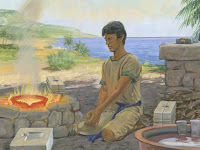What content was included in the Brass Plates? They contained much of what we have in the Old Testament or Hebrew Bible. They contained the writings of Moses: Genesis, Exodus, Leviticus, Numbers, and Deuteronomy, including the Law of Moses. They had some of the historical records of the House of Israel down to the days of Zedekiah. They contained the writings of the ancient prophets, including well-known prophets Isaiah and Jeremiah; three somewhat obscure prophets whose writings we do not have: Zenock, Zenos, and Neum; the genealogy of Lehi's family including the writings of his ancestor, Joseph who was sold into Egypt.
One can tell how important these records were by looking at the prophecies the Book of Mormon prophets chose to share. Inevitably, these verses dealt with Jesus Christ and the House of Israel. Why was that important to the Nephites? Why are that important today? Nephi explains: For the things which some men esteem to be of great worth, both to body and soul, others set at naught and trample under their feet. Yea, even the God of Israel do men trample under their feet . . .. And the world, because of their iniquity, shall judge him to be a thing of naught . . .. (1 Nephi 19: 7, 9)
When my children were growing up, most people still accepted the Bible at one level or another. Most Christians who professed a belief in Christ, actually did believe for the most part. That is not the case today. Even some practicing Christians do not truly believe. Some Christian scholars have degraded Him to an historical figure who, while being a good man, was not Divine.* The day has come when many people, including many Christians, regard Him as a thing of naught.
The Book of Mormon offers many things to clarify and support Biblical references to the Savior: the physicality of His resurrection, His baptism and wilderness experience, the Sermon on the Mount. Nephi quotes Old Testament prophets from the Brass Plates and also corrects and supports the writings therein. Since the Plates date to the days of Zedekiah, last king of Judah, they are much closer to the original sources than anything we have today. This is especially true of the Prophet Isaiah.
Because of the Book of Mormon, men and women who esteem the Savior as naught are left without excuse.
~ ~ ~ ~ ~
 |
| Jesus Christ with the Prophet Isaiah |
Actually, Nephi's quoting of Isaiah is important. He wrote that it was hard for many of [his]people to understand; for they know not concerning the manner of prophesying among the Jews. (2 Nephi 25:1) Because of this, Nephi writes explanation and commentary on Isaiah for his people. He told his people to liken the scriptures unto themselves. A prayerful study of the text he quotes and the commentary he gives can help us understand and liken the scriptures to ourselves and our circumstances as well. Isaiah, of all ancient prophets, wrote more about the Savior and the gathering of Israel than any other. His words are the most quoted in other scriptures. Even Christ Himself taught that we must study the words of Isaiah for great are the words of Isaiah.
©January 2020, Dr. Kathleen Rawlings
Buntin Danielson
* See the Search for the Historical Jesus by the Jesus Seminar, 1985 - 2006. Found in many books and sources on the web.





































